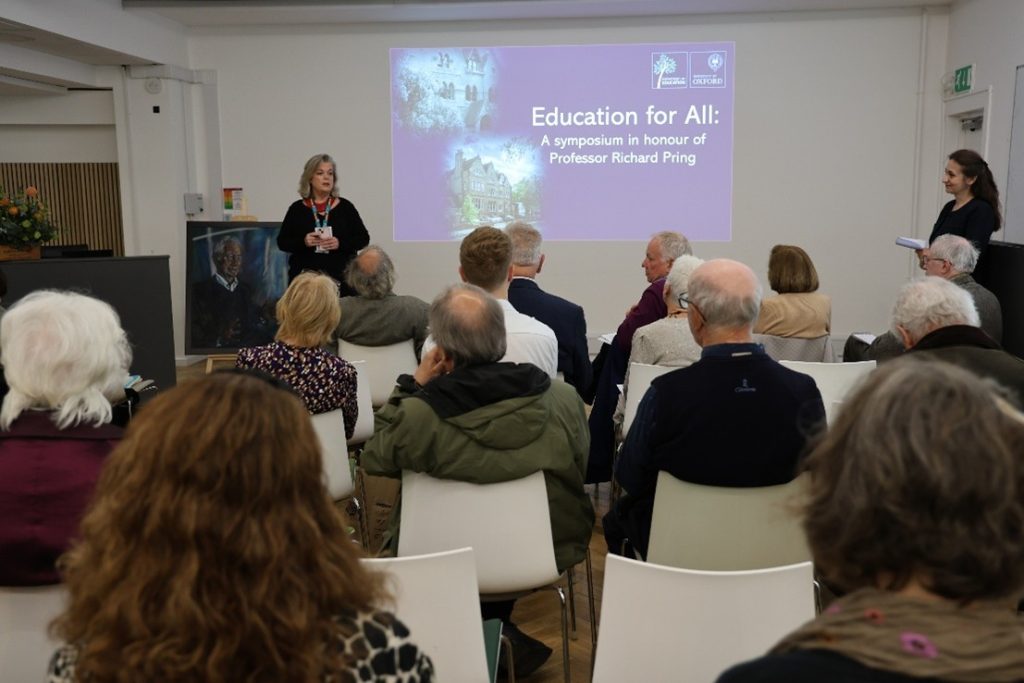Research ‘English as an Additional Language: Proficiency in English, educational achievement and rate of progression in English language learning’¹ published today by researchers at the University of Oxford’s Department of Education, The Bell Foundation and Unbound Philanthropy is the latest report in a research programme on English as an Additional Language (EAL). The report provides vital insights into how long it takes, and what support is needed, to enable learners who are New to English to achieve Proficiency in English.
The report, which analysed nine-years of anonymised Proficiency in English data from the Welsh Pupil Level Annual School Census (which the research team established to be equally relevant in England), shows that only 31% of pupils who start in Reception class with the lowest level of English language proficiency (classed as New to English²) progress to Competent or Fluent in English (the highest levels of proficiency) by the time they leave primary school. Many EAL pupils, therefore, need more than six years of support to achieve Proficiency in English which is the point at which the learner is able to fully access the curriculum and therefore to fulfil their academic potential. However, the National Funding Formula³ only provides EAL funding for three years. This funding is less than other English-speaking jurisdictions such as New Zealand, New South Wales, Alberta and some US States, where five years of support is common, and some areas offer up to seven years for vulnerable groups such as refugees?.
As Professor Steve Strand, Department of Education, University of Oxford, the research author highlights, “Our finding that over three-quarters of pupils who start in Reception as New to English progress to Developing Competence, which is the middle proficiency level, by the end of primary school is promising, in that most of these pupils are likely to be able to access the English language curriculum in secondary school. However, the fact that, even six years after starting Reception as New to English, only around one-third of pupils have transitioned to Competent or above is concerning; this suggests that while many pupils have Developing Competence, relatively few reach the highest levels of proficiency, at which they are able to fully access the curriculum, in this timeframe. Our research also shows that Proficiency in English is the major factor influencing the educational achievement of pupils with EAL. This research demonstrates the importance of assessing Proficiency in English and the need to provide the right type and length of support for each learner.”
Diana Sutton, Director, The Bell Foundation says, “Aggregated statistics for this group of learners fails to tell the whole story due to the diverse nature of this group of students which can range from Fluent bilingual learners to those New to English. The Department for Education has now recognised this, that those who join after the Reception year are less likely to reach the expected standard than pupils whose first language was English, and that the likelihood of a pupil meeting this standard declines the later they arrive in the system. This report provides further clear evidence on why assessing Proficiency in English is so important. Speaking more than one language has positive associations with attainment once academic proficiency in English is achieved, however low proficiency in the language of instruction at school means learners will struggle to access the curriculum. Pupils, particularly those arriving later in the system need to acquire the proficiency that they need to succeed. This provides further evidence to support the call for the Department for Education to reinstate the requirement for schools to assess and record the English language proficiency of EAL learners. We recommend that the Department issues new guidance to schools about the importance of using robust processes to assess and progress the English language proficiency of their learners using EAL and reintroduces the requirement in the School Census to report on the Proficiency in English of EAL learners.”
Learners using EAL are a hugely diverse group with country of birth, time of arrival in the school system, first language spoken, previous education and background all contributing to that diversity and their likelihood to succeed?. The research released today shows that pupils with the lower levels of English language proficiency underperform in comparison to their English as a First Language peers and therefore require more support to meet their individual needs. It is not until pupils are Competent or Fluent (the highest levels of proficiency) in the English language that they are more likely to have higher attainment than their monolingual peers in GCSEs.
Findings from the EAL research programme also demonstrate that the key to ensuring that learners using EAL fulfil their potential is also a question of equity and about providing the right support for each pupil. This can be achieved through assessing the level of Proficiency in English at the beginning and throughout a pupil’s time at school to identify those with the greatest need for support, for example, pupils who start school as New to English, and pupils who join the education system at a later school stage.
END
¹ Strand, S. & Lindorff, A. (2020) ‘English as an Additional Language: Proficiency in English, educational achievement and rate of progression in English language learning’, University of Oxford, The Bell Foundation and Unbound Philanthropy http://bit.ly/37RKFZv
² The Department for Education in England introduced a five-point Proficiency in English scale, from A ‘New to English’ to E ‘Fluent’, to assess the English language proficiency of learners using EAL in the 2017 School Census. This meant that schools began to be aware of the importance of proficiency. Although the requirement was removed in 2018, the Department did issue an advisory note in 2019 (Department for Education (June 2019) ‘Attainment of pupils with English as an additional language’) which acknowledged the diversity of this cohort of learners. The Department for Education’s five-point Proficiency in English Scale (now withdrawn) ranged from ‘A’ New to English, through ‘B’ Early Acquisition, ‘C’ Developing Competence, ‘D’ Competent, to ‘E’ Fluent
³ The National Funding Formula provides schools with core revenue funding based on pupil characteristics https://assets.publishing.service.gov.uk/government/uploads/system/uploads/attachment_data/file/736053/Schools_block_national_funding_formula-Technical_note.pdf
? Hutchinson, J. (2018) ‘Educational Outcomes of Children with English as an Additional Language’, Education Policy Institute, The Bell Foundation and Unbound Philanthropy, http://bit.ly/EALoutcomes
NOTES TO EDITOR
- The full report can be downloaded from http://bit.ly/37RKFZv
- The executive summary of this report is also available in Welsh http://bit.ly/2HKBkrK
- Professor Steve Strand, Department of Education, University of Oxford, will be presenting a webinar on this research on Thursday 27 February 2020 at 4pm, find out more here: http://bit.ly/EALwebinar11
- The report, written by Professor Steve Strand and Dr Ariel Lindorff, Department of Education, University of Oxford, analysed Proficiency in English data from the Welsh Pupil Level Annual School Census (PLASC). The Welsh Government has been recording the Proficiency in English of pupils annually since 2009, which provided data for this cross-sectional and longitudinal study. In total 3,528,064 anonymised pupil records across a nine-year period (from Reception to Year 11) were analysed. As the data is recorded using the same five-point PIE scale as the one used in England in 2017-2018 the research team found that the group was comparable to that in the English National Pupil Database and therefore the findings are as relevant in England as they are in Wales.
- Proficiency in English data was only collected for pupils whose first language is not either English or Welsh, so speakers of Welsh are not considered to have EAL. The ratings are specifically of Proficiency in English, not of Proficiency in Welsh. The report uses the shorthand ‘English/Welsh speakers’ for the group of pupils who speak English and/or Welsh, to contrast them with the EAL group.
- This is the latest report in a series of research on EAL. The Executive Summary includes details on the key findings from some of the previous reports, which analysed trends in the relationship between EAL and educational achievement, including:
- Strand, Malmberg and Hall (2015):
- In 2019, ‘The EAL population in English schools was 1.56 million EAL pupils, constituting just under one-in-five (19.6%) of all pupils aged 5-16. While one-quarter of schools had <1% of pupils recorded as EAL, in around 1 in 11 schools EAL pupils constituted >50% of the pupil roll, so need was very concentrated in some schools.’
- ‘There was huge variation in the educational results achieved by pupils classified as EAL, risk factors include Special Educational Needs, socio-economic deprivation, gender and season of birth’
- ‘The definition of EAL used in the National Pupil Database is limited because it gives no indication of a student’s pro?ciency in the English language as it includes both second generation ethnic minority students and new arrivals in the English school system with no English’
- ‘Proficiency in the English language is the major factor influencing the educational achievement and the degree of support an EAL student will require, and it is low Proficiency in English associated with international arrivals that is proxied by the risk factors identified above’
- Strand and Hessel (2018):
- ‘EAL pupils varied widely in terms of their degree of Proficiency in English. In the context of mainstream schooling in England this was not a trivial observation. Teaching is almost entirely delivered through the medium of English language, be it texts, video or audio materials, or in classroom discussions. A group of pupils who can only access this information to a limited degree is also less likely to perform to their full potential.
- ‘What mattered most for EAL pupils’ degree of English proficiency was not their ethnicity, gender or FSM eligibility, but their age’
- ‘Language support is particularly important in the early years of primary education in order to allow pupils to access the curriculum from the earliest stage’. Although support is also needed for those arriving late into the school system.
- ‘Proficiency in English could explain 22% of the variation in EAL pupils’ achievement, compared to the typical 3-4% that can be statistically explained using gender, Free School Meal status and ethnicity’
- Being bilingual can have positive associations with achievement as pupils rated Competent or Fluent in English typically have higher educational achievement than monolingual peers. However, pupils who are New to English, Early Acquisition or Developing Competence will need support to acquire the Proficiency in English they need to develop to their full potential.
- Strand, Malmberg and Hall (2015):
About The Bell Foundation
The Bell Foundation is a charity which aims to overcome exclusion through language education by working with partners on innovation, research, training and practical interventions. Through generating and applying evidence, we aim to change practice, policy and systems for children, adults and communities in the UK disadvantaged through language.
The Bell Foundation provides an EAL Assessment Framework, and a digital Tracker which automatically provide suggested tailored support strategies for each learner and a reporting tool which provides and records termly progress which can be shared with other teachers and parents. The tools, one set each for EYFS, primary schools and secondary schools, have been developed by leading academics, have won a prestigious British Council ELTons Award for Local Innovation, are designed for busy teachers and are free to download.
- EAL Assessment Framework and Digital Tracker/Reporting tool, along with instructional videos, can be accessed here: http://bit.ly/EALassess
- Free resources and Great Ideas support strategies can be accessed here: http://bit.ly/EALnexus
- The Foundation also provides research, free webinars and training courses (online, blended and face-to-face), more information on these can be found on the Foundation’s website: https://www.bell-foundation.org.uk/
Media enquiries regarding this announcement should be directed to Julia Shervington, Communications Manager, Julia.Shervington@bell-foundation.org.uk or 01223 275501
About the Department of Education, University of Oxford
The Department of Education started out as a department for training teachers, and is now also renowned for its research excellence. It was ranked first in the UK in the most recent Research Excellence Framework (REF) and is the highest ranked education faculty in Europe by the 2020 Times Higher Education’s World University Rankings subject league. The department has many research collaborations within the social sciences division and of course the University more widely. Our research is outward-facing, with projects that are transformative not just for the research field, but for governments, charities, industry and all levels of the educational sector. The department also stays true to its origins and provides excellence in teacher education, having achieved the highest possible grades by the Office for Standards in Education (OFSTED) for six consecutive inspections and is recognised as an ‘outstanding’ provider.
https://www.education.ox.ac.uk/
About Unbound Philanthropy
Unbound Philanthropy is an independent private grant-making foundation that works to ensure that migrants and refugees are treated with respect and engage with their new communities. We support pragmatic, innovative, and responsive approaches to immigration and immigrant integration in the United States and United Kingdom.










